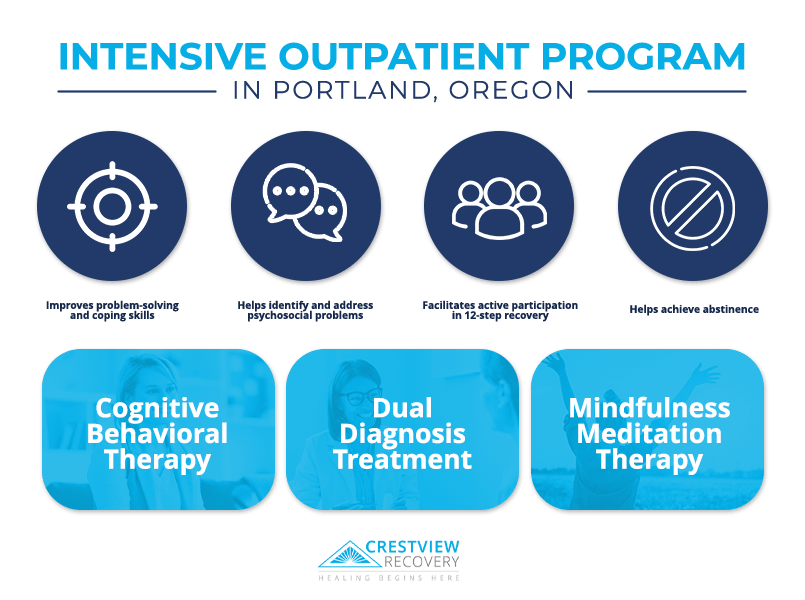
Healing Begins Here
Our Portland, Oregon drug rehab center addresses this need by providing a top-tier intensive outpatient program (IOP), ensuring high-quality care while accommodating diverse schedules. Nearly half of all substance use treatment facilities recognize the value of IOP, making it a widely acknowledged and effective option for those seeking a more intensive level of service than traditional outpatient treatment.
If you’re in need of comprehensive substance use treatment in Portland, our IOP could be the right fit for you.
If you’re looking for an intensive outpatient program in Portland, Oregon, you’re in the right place. Our program offers comprehensive support and treatment for individuals struggling with addiction or mental health issues. With a focus on individualized care and evidence-based therapies, our outpatient program provides a flexible and effective option for those seeking recovery.
Our team of experienced professionals is dedicated to helping you achieve lasting change and improve your overall well-being. Contact us today to learn more about our intensive outpatient program in Portland, Oregon.


WHICH PROGRAM IS RIGHT FOR YOU?
Intensive Outpatient Program (IOP) does not require a residential stay, allowing individuals to live at home while receiving treatment. On the other hand, Partial Hospitalization Program (PHP) involves staying in a sober home for up to 90 days, providing a more structured and immersive environment.
PHP demands a significant time commitment as patients are required to stay away from home, impacting their job and family obligations. In contrast, IOP offers a more flexible schedule, enabling individuals to attend treatment sessions while maintaining their daily life routines.
PHP can pose challenges for individuals who cannot take extended leave from work or fulfill family responsibilities due to the residential commitment. IOP, however, serves as a flexible alternative, allowing individuals to balance work, family, or educational commitments during their treatment.
While PHP is a comprehensive program that involves individual and group therapy, coping strategies, and holistic recovery, IOP places emphasis on achieving abstinence, fostering behavioral changes, and active participation in community-based support systems.
PHP involves a more structured and residential setting, providing a focused environment for intensive treatment. In contrast, IOP allows individuals to receive treatment while living in their own homes, offering a less restrictive setting.
While PHP offers therapeutic benefits within a residential setting, IOP provides similar therapeutic benefits without the need for extended residential stays, allowing for a more flexible approach to treatment.
PHP is less flexible due to the residential commitment, requiring individuals to stay away from their usual living arrangements. In contrast, IOP offers greater flexibility, accommodating various schedules and commitments, enabling individuals to maintain a sense of normalcy in their daily lives.
PHP involves patients being away from their job, family, and daily responsibilities to focus on intensive treatment. IOP, however, allows patients to tend to their everyday lives while receiving treatment, promoting a balanced approach to recovery.
THERAPY IN IOP

Among the addiction therapy services provided:
Individually conducted, CBT explores patients’ preconceptions, biases, and assumptions. This talk therapy empowers individuals to recognize and transform negative thinking into positive patterns, fostering a constructive mindset vital for sustained recovery.
Combining awareness and meditation, this therapy focuses on the present moment, enhancing concentration and calming the mind. Cultivating mindfulness helps patients live in the moment, reducing fixation on the past or anxiety about the future. This approach instills the habit of avoiding harmful thought patterns, contributing to a more mindful recovery journey.
Integrated into our treatment plans, Family Therapy addresses the impact of addiction on familial relationships, fostering understanding and support. It provides a dedicated space for families to navigate the challenges of addiction collectively.
Tailored to the unique needs of each patient, Individual Therapy offers personalized sessions. This one-on-one approach ensures focused attention on the individual’s specific challenges, promoting a deeper understanding and personalized coping strategies.
Creating a supportive community for shared experiences and mutual encouragement, Group Therapy promotes a sense of connection and shared progress. This collaborative environment contributes to the overall therapeutic journey, emphasizing the power of communal support.
Integrated to promote emotional regulation and interpersonal effectiveness, DBT is an evidence-based therapy equipping patients with skills to manage stress, navigate relationships, and regulate emotions. These skills are integral to the recovery process.
Considering the mind-body connection, Holistic Therapy incorporates techniques such as yoga or acupuncture to address overall well-being. This holistic approach emphasizes balance and integration in the recovery journey.
Focused on healing past traumas and understanding their impact on addiction, Trauma Therapy provides tools for coping and resilience. By addressing underlying trauma, this therapy contributes to a more holistic and sustainable recovery journey.
These diverse therapeutic interventions empower patients with a range of tools and resources, recognizing the uniqueness of each individual’s path to healing from addiction.
IOP FOR ADDICTION
With a focus on individualized plans, our IOP not only facilitates the development of coping skills but also encourages self-awareness and a positive support network. This outpatient program allows clients to receive therapeutic benefits while managing daily responsibilities, making it an effective and accessible option for those on the path to recovery.
IOP FOR MENTAL HEALTH TREATMENT
The IOP setting allows clients to actively participate in individual therapy sessions, group therapy, and dialectical behavior therapy (DBT) while maintaining their daily routines. This comprehensive approach not only aids in managing mental health symptoms but also empowers individuals to build resilience, self-awareness, and a positive support network for lasting recovery.


DUAL DIAGNOSIS PROGRAM
USING INSURANCE FOR INTENSIVE OUTPATIENT TREATMENT

OUTPATIENT DRUG TREATMENT IN PORTLAND, OREGON
- Maintaining abstinence from substances for 30 days or longer
- Accomplishing goals established with their counselor or therapist
- Actively implementing a relapse prevention plan
- Participating in support groups or communities
- Developing a sober support network fostering positive habits
- Securing drug and alcohol-free housing
- Embracing these steps as a foundation for the next stage in their life of sobriety
Crestview Recovery is committed to guiding individuals through these transformative stages, ensuring a comprehensive and effective approach to recovery.
EMBRACE SOBRIETY AT CRESTVIEW RECOVERY
Our residential addiction treatment in Portland, Oregon, offers intensive, 24/7 care.
Outpatient addiction treatment is a good option for those transitioning out of intensive programs or for those who need more flexible treatment options.
Our treatment team can address a myriad of mental health concerns, including psychiatric disorders, anxiety, PTSD, depression, and trauma. We also offer medication management services.
This program addresses addiction and mental health as co-occurring or individual issues.
This is more intensive than IOP but also treats dual diagnosis, drug and alcohol abuse, and mental health challenges.
We offer virtual sessions in our telehealth program.
Continue your recovery in one of our sober living homes in Oregon, where you can stay with other sober individuals.
Our aftercare program in Portland, Oregon provides relapse prevention training and guidance on the next steps of recovery.
Our commitment extends to virtual sessions, ensuring accessible and comprehensive care for mental health and addiction concerns.






















